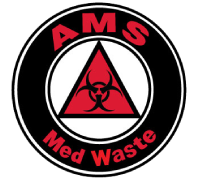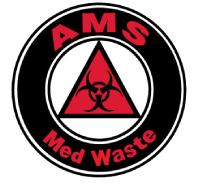Ensuring patient safety and a healthy environment are top priorities for dental practices in Wisconsin. But one crucial aspect often gets overlooked: proper medical waste disposal. Disposing of needles, swabs, and expired medications requires a specific approach to safeguard:
- Staff Safety: Sharps injuries and exposure to infectious agents like Hepatitis B or HIV can occur from improperly handled waste.
- Environmental Protection: Certain medications and chemicals present in dental waste can contaminate water supplies if not disposed of correctly.
- Regulatory Compliance: Dental practices have a legal obligation to manage medical waste according to state and federal regulations. Non-compliance can result in hefty fines or even license suspension.
This comprehensive guide, written by AMS MedWaste – southern Wisconsin’s trusted medical waste disposal partner – will equip you with the knowledge to manage dental waste effectively and ensure you remain compliant with all regulations.
Understanding Dental Waste Categories
The Environmental Protection Agency (EPA) classifies medical waste into different categories, each with specific disposal requirements. Here’s a breakdown of the key types of dental waste you’ll encounter:
- Sharps Waste: This includes needles, syringes, scalpels, and lancets. These sharp objects can pierce the skin and transmit serious diseases like Hepatitis B and HIV. Improper disposal creates a significant risk of accidental injury and bloodborne infection for staff and anyone handling the waste.
- Infectious Waste: These are materials potentially contaminated with blood, bodily fluids, or other infectious agents. Used swabs, gauze pads, soiled gloves, and some lab cultures fall under this category. Careful handling and disposal are crucial to prevent the spread of disease.
- Pharmaceutical Waste: Unused, expired, or contaminated medications, such as local anesthetics and antibiotics, require special attention. Improper disposal can contaminate water supplies and pose a risk of misuse.
- Solid Waste: While not as high-risk as sharps or infectious waste, proper disposal of solid waste is still important. This category includes non-sharp items that come into contact with bodily fluids during procedures, like used bibs, gowns, and suction filters. Maintaining a clean and hygienic environment is essential for your practice.
The Dangers of Improper Dental Waste Disposal
Cutting corners with waste disposal? Think again. Disposing of dental waste in the regular trash or down the drain might seem convenient, but the consequences can be severe. We’re talking:
- Safety Hazards: Improperly disposed sharps can cause injuries to sanitation workers or anyone who comes into contact with them. Infectious waste, if not handled correctly, can expose staff and patients to harmful bacteria and viruses.
- Environmental Damage: Certain medications and chemicals present in dental waste can contaminate water supplies if not disposed of properly. Improper disposal can have lasting negative effects on the environment.
- Legal Repercussions: Dental practices have a legal obligation to manage medical waste according to specific regulations set forth by state and federal agencies. Non-compliance with these regulations can result in hefty fines and even license suspension.
Ensuring Regulatory Compliance For Your Dental Clinic
The EPA sets the groundwork for medical waste disposal in the U.S. https://www.epa.gov/rcra/medical-waste. However, each state adds its own regulations, ensuring a safe and compliant environment. Here in Wisconsin, specific guidelines exist for handling and disposing of various dental waste types.
Staying on top of these regulations can feel overwhelming, but it’s essential. Non-compliance can lead to hefty fines and even license suspension. That’s why having a trusted partner like AMS MedWaste is key. We’ll help you navigate the complexities and ensure your practice operates smoothly and safely.
Partnering with AMS MedWaste for a Compliant and Stress-Free Solution
Dental practices in Wisconsin face unique challenges, and proper medical waste disposal is no exception. At AMS MedWaste, we understand. We offer a comprehensive solution designed to simplify your workflow and ensure complete compliance.
Streamlined Segregation & Secure Storage:
We take the guesswork out of waste segregation. Our designated containers are clearly labeled for infectious waste (blood, fluids, sharps), pathological waste (tissues), and pharmaceutical waste (expired medications). We’ll provide expert guidance to ensure proper sorting at your practice, minimizing the risk of errors and maximizing efficiency.
Sustainable Disposal & Peace of Mind: Operate with Confidence
At AMS MedWaste, environmental responsibility is a priority. We convert your medical waste into a clean-burning fuel source, reducing your environmental impact and providing a responsible alternative to traditional disposal methods. This allows you to focus on patient care with the peace of mind of knowing your waste is handled sustainably.
Reach out to us today for a free consultation! Experience the confidence that comes with a compliant and sustainable waste disposal solution from AMS MedWaste.






